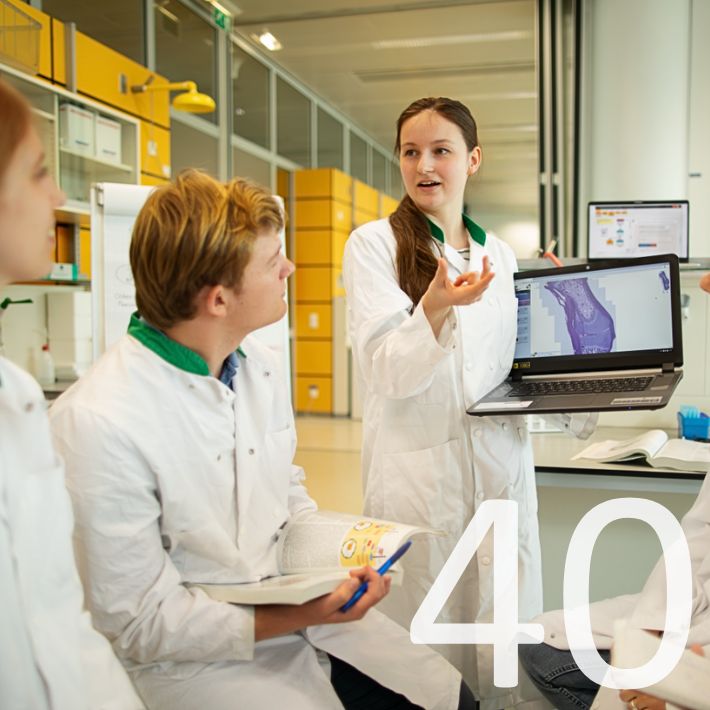Biomedical Sciences: valued, small-scaled and forward-looking
&width=710&height=710)
A dive into history
In 1984, Biomedical Sciences began as the doctoral program in “Health Sciences. This new program was intended to strengthen the connection between research and the clinic. In 1989, the name changed to Biomedical Sciences (BW). Until then, BW fell under Medicine, but with the name change, the program became more independent. This additionally meant that it received its own training and examination board.
Several changes were implemented around the turn of the century. This had several reasons: the program had to modernize and offer a more varied program as a result of a review report, the government decided that doctoral programs should be converted into separate bachelor and master programs, and the Faculty of Medicine at Leiden University merged with the Academic Hospital Leiden (forming the LUMC).
Milestones and uniqueness
Jolanda van der Zee, program director of the master's program, says, “All of that together made BW one of the first programs in the Netherlands to introduce the bachelor's and master's structure. We were also one of the first with a double option for students interested in both Biomedical Sciences and Medicine, the Health specialization of the master. And since 2001 we have had a special intercurricular collaboration with the Karolinska Institute in Sweden in the undergraduate program. The cooperation helps prepare students for the international field of work they are entering.”
“What we are also very proud of is the appreciation that students give us in the National Student Survey,” says Kees Tensen, just stepping down as the bachelor's program director after eleven years, “Since 2015, the bachelor's has been awarded the predicate Top Program in the Keuzegids Universiteiten. This is mainly due to our involved students and teachers. Feedback is taken seriously and used. In addition, we are one of only two BW providers in the Netherlands that are really in the hospital rather than in the neighborhood. Also, our students don't have to specialize immediately in the bachelor's, this makes them widely educated.”
Challenges
BW has also faced challenges over the past 40 years. Van der Zee: “The corona crisis was a particular challenge. From one day to the next, students were sitting at home. Where we could, we kept teaching going. Practicals have to be done on campus. It's incredibly clever how students and faculty dealt with this.”
The visitations that assess the quality of education are also always exciting. Tensen: “I remember one visitation where we received an ‘adequate’. We wanted to get to a 'good'. That drive typifies the programs. Everyone put their shoulders to the wheel, with results. Because the next time, we had achieved the desired 'good'.”
Biomedical Sciences in 40 years
BW's undergraduate and graduate programs continue to evolve. Nelleke Gruis has taken over from Tensen as program director for the bachelor's and says, “We try to move with where our students end up. There are several career paths they can follow. It's important to align your courses with that.”
Van der Zee: “Students will not all be able to work at a university after graduation. There are many opportunities outside academia, where good research is done. That's why we have a new teaching block in the bachelor's in which we take students to companies at the Leiden Bio Science Park, and we work together with LURIS and PLNT Leiden. Many students do not necessarily start their own companies, but skills such as creativity, networking and perseverance are very valuable for their future careers.”
Tensen: “In addition, understanding and processing large data sets has become increasingly important. Where we used to be in the lab and it took days for a determination, now it is much faster. Students need to be able to handle those large data sets. People are still in the lab, but you have to check the data for quality and be able to extract meaningful information from this. Students need to be prepared for that.”
Biomedical Sciences' 40th anniversary was celebrated in June with a symposium attended by many former students and staff. Want to know more about the bachelor and master program? Find more information here.